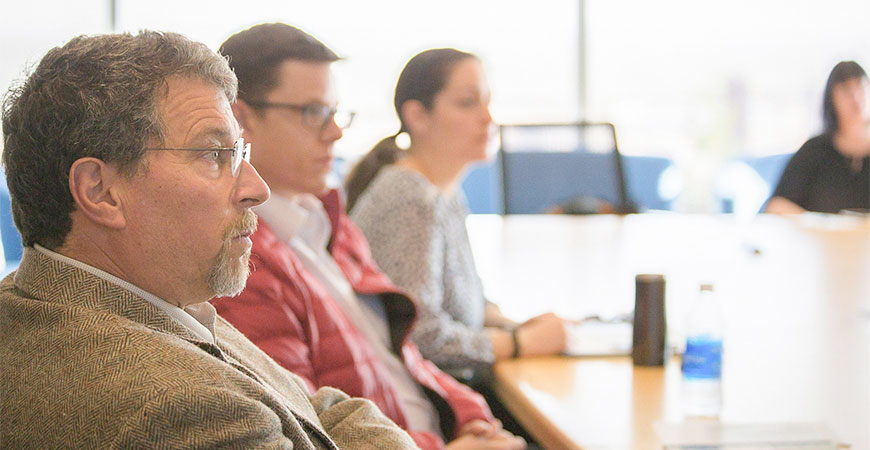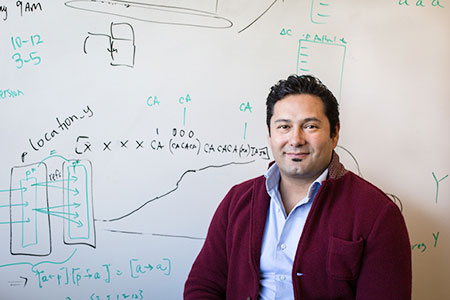
Management Professor Alexander Petersen said that without the roadmaps UC Merced offers for new faculty, he’d have been adrift on campus his first year.
“I tend to get lost easily when there is a deluge of new information, so the new faculty seminars appropriately spread out information across the entire year into more digestible pieces,” he said.
Orientation seminars, though, are just one of the resources available to untenured faculty members who are new to UC Merced.
There are scholarships for professional development and workshops to help improve pedagogy, among other offerings. Academic Recruitment and Faculty Development Analyst Sharon Butler said the resources are designed to help new faculty hit the ground running and achieve success in teaching and research.
For example, the Center for Engaged Teaching and Learning (CETL) offers the Faculty Academy on Teaching First-Year Students, to help new faculty understand first-year students’ needs and assist with instructional resource planning.
The UC Merced Library also helps faculty develop research assignments for students, including assignment reviews to make sure the library’s collection supports the requirements and that students will be successful locating, evaluating and using information.
There’s also UC Merced’s partnership with the National Center for Faculty Development & Diversity (NCFDD), which offers professional development resources and support such as mentoring, problem solving assistance, and help in navigating the processes of publication and getting external funding.

But perhaps the cornerstone of new faculty resources is the Mentorship Program , begun by the Academic Personnel Office and the Senate Faculty Welfare and Academic Freedom committees. It is available to all untenured faulty, and through it, the university provides funding for pre-tenure-track faculty members to meet with mentors who are not local or to bring them to campus or to attend mentorship activities. The program encourages inter-UC relationships, and tries to partner new faculty with senior faculty members on campus.
Mentoring plays an invaluable role in faculty development and advancement, and is most effective when it can help ensure that each new faculty member’s goals and objectives are met, Butler said. Additionally, the Academic Senate offers an award for excellence in faculty mentorship.
Between 50 percent and 75 percent of new faculty members take advantage of the NCFDD resources, and most take part in the mentoring program within the UC and on campus.
“The program has been great for me. I have visited my mentor at UC San Diego for a week, and he has also visited me here,” Professor Greg Wright said. “When I was at UCSD I gave a seminar and met with lots of people. And I have found that senior people think the mentor program is great as well, because they get to interact with junior people in the UC system, who are often more research-active, or at least more at the forefront of the literature. I think it is a win-win."
In addition to orientation sessions throughout the school year, each fall and spring the vice provost for faculty organizes a workshop series that provides all new faculty members with focused attention on key concepts and resources in smaller workshops with leading campus experts, Butler said.
And as part of the UC, the rank-and-step system requires faculty members to achieve smaller steps to earn larger titles.
“We reward them at every step,” Butler said. “They get constant feedback, every two to three years, instead of waiting the usual six to 10 years between advancements.”
The campus is still relatively small, despite the ongoing growth, and it functions like a large family in many ways, faculty members say. They often work together and help each other get settled in and oriented to life in Merced — which can be much different from their last schools.
Open-door policies, especially with leadership, also benefit junior faculty.
“The chance to have face-time and dialogue with Gregg Camfield especially stands out as a great experience,” Petersen said. “Not only is he wise and informed as to everything UC, but talking with him was also comforting in knowing that the leadership generally cares.”
Lorena Anderson

Senior Writer and Public Information Representative
Office: (209) 228-4406
Mobile: (209) 201-6255






